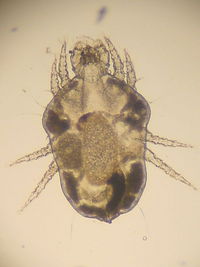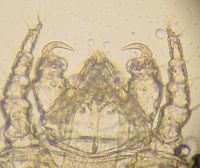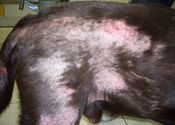Difference between revisions of "Cheyletiellosis"
TestStudent (talk | contribs) |
|||
| (28 intermediate revisions by 2 users not shown) | |||
| Line 1: | Line 1: | ||
| − | + | {{OpenPagesTop}} | |
| + | Also known as: '''''Walking dandruff''''' | ||
| + | ==Introduction== | ||
| + | {{Taxobox | ||
| + | |name =''Cheyletiella'' | ||
| + | |phylum =Arthropoda | ||
| + | |class =Arachnida | ||
| + | |subclass =Acari | ||
| + | |order =Trombidiformes | ||
| + | |family =Cheyletidae | ||
| + | |genus =Cheyletiella | ||
| + | }} | ||
| + | [[Image:cheyletiella.jpg|thumb|right|200px|''Cheyletiella mite'' - Kalumet 2004,Wikimedia Commons]] | ||
| + | [[Image:cheyletiella 2.jpg|thumb|right|200px|''Cheyletiella mite closeup'' - Kalumet 2004,Wikimedia Commons]] | ||
| + | [[File:chey.jpg|right|thumb|175px|<small><center>Cheyletiellosis in a Labrador Retriever (from Uwe Gille (2008), Wikicommons]</center></small>]] | ||
| + | Cheyletiellosis is a contagious disease caused by ''Cheyletiella'' sp. The [[:Category:Mites|mites]] live on the [[Skin - Anatomy & Physiology|skin]] surface causing itching and [[Skin Glossary - Pathology#Scale|scale]] on affected animals. Transmission is mainly by direct contact but the mites can also be transported between animals via a [[:Category:Fleas|flea]] or [[:Category:Lice - Dog|lice]]. It is a zoonotic disease. | ||
| + | ==Mites== | ||
| + | Cheyletiella mites are [[Non-Burrowing Mites|surface mites]] of dogs and cats. | ||
| + | They are also found on humans and rabbits. They cause Cheyletiellosis, a parasitic skin infestation. | ||
| − | + | They have a waisted body and claw like palps on their heads. They also have combs at the ends of their legs. | |
| − | |||
| − | |||
| − | |||
| − | |||
| − | |||
| − | == | + | ===Lifecycle=== |
| − | |||
| − | |||
| − | + | The lifecycle of a Cheyletiella mite lasts 21-35 days on the host. The adults mites can survive off the host for 2-14 days. They live on the skin surface and their eggs are attached to hair shafts. | |
| + | |||
| + | ===Important Species=== | ||
| + | ''C.yasguri''- Most commonly found on dogs. | ||
| + | |||
| + | ''C.blakei''- Most commonly found on cats and humans. | ||
| + | |||
| + | ''C.parasitivorax''- Most commonly [[Mites – Rabbit#Cheyletiella parasitivorax|found on rabbits]]. | ||
==Signalment== | ==Signalment== | ||
Occurs in dogs, cats, rabbits, humans and wild animals. There is no breed, sex or age predisposition but it is often seen in puppies probably due to management reasons. | Occurs in dogs, cats, rabbits, humans and wild animals. There is no breed, sex or age predisposition but it is often seen in puppies probably due to management reasons. | ||
| − | |||
==Diagnosis== | ==Diagnosis== | ||
| − | |||
A diagnosis can be made on history and clinical signs in combination with demonstration of the parasite. | A diagnosis can be made on history and clinical signs in combination with demonstration of the parasite. | ||
| − | Scurf can be brushed onto dark paper | + | Scurf can be brushed onto dark paper and 'Walking dandruff' will be seen as mites will move when present in large numbers. |
The parasite can also be identified microscopically from skin scrapings, coat brushes and hair plucking form scaly areas. | The parasite can also be identified microscopically from skin scrapings, coat brushes and hair plucking form scaly areas. | ||
| Line 32: | Line 48: | ||
In dogs hyperkeratosis of the skin occurs and dry, white, scaly dandruff can be seen along the back of the animal. | In dogs hyperkeratosis of the skin occurs and dry, white, scaly dandruff can be seen along the back of the animal. | ||
| − | Marked | + | Marked pruritus is sometimes present which in severe cases can be confused as neurological disease. |
| − | In cats | + | In cats pruritus is also a common feature with the presence of scale and [[Skin Glossary - Pathology#papules|papules]]. Miliary dermatitis is a commmon finding normally on the neck or back of the cat. |
| − | or back of the cat. | ||
==Pathology== | ==Pathology== | ||
Grossly: Focal, multifocal or generalised red papules or crusts occur often along the dorsum of the animal. | Grossly: Focal, multifocal or generalised red papules or crusts occur often along the dorsum of the animal. | ||
| − | Microscopically: Superficial perivascular dermatitis is present with infiltrating eosinophils. | + | Microscopically: Superficial perivascular dermatitis is present with infiltrating [[Eosinophils|eosinophils]]. |
==Treatment== | ==Treatment== | ||
| − | |||
All in contact animals should be treated. | All in contact animals should be treated. | ||
The environment the animal has been living in should be cleaned and also treated. | The environment the animal has been living in should be cleaned and also treated. | ||
| Line 52: | Line 66: | ||
Good, will resolve with treatment as long as the animal does not become re-infested. | Good, will resolve with treatment as long as the animal does not become re-infested. | ||
| + | |||
| + | {{Learning | ||
| + | |Vetstream = [https://www.vetstream.com/canis/Content/Disease/dis02357.asp Cheyletiellosis in dogs]<br>[https://www.vetstream.com/canis/Content/Bug/bug00051.asp Cheyletiella yasguri image] | ||
| + | |flashcards = [[Mites_Flashcards|Mites Flashcards]]<br>[[Small Mammals Q&A 13]]<br>[[Rabbit Medicine and Surgery Q&A 17]] | ||
| + | |literature search = [http://www.cabdirect.org/search.html?rowId=1&options1=AND&q1=Cheyletiellosis&occuring1=title&rowId=2&options2=AND&q2=&occuring2=freetext&rowId=3&options3=AND&q3=&occuring3=freetext&publishedstart=yyyy&publishedend=yyyy&calendarInput=yyyy-mm-dd&la=any&it=any&show=all&x=46&y=5 Cheylletiellosis publications] | ||
| + | }} | ||
==References== | ==References== | ||
| + | |||
Foster A.P and Foil C.S (2003) '''BSAVA manual of Small Animal Dermatology'''. 2nd edition. BSAVA. | Foster A.P and Foil C.S (2003) '''BSAVA manual of Small Animal Dermatology'''. 2nd edition. BSAVA. | ||
| − | [[Category: | + | Taylor, M.A, Coop, R.L., Wall,R.L. (2007) '''Veterinary Parasitology''' ''Blackwell Publishing'' |
| − | [[Category: | + | |
| + | |||
| + | {{review}} | ||
| + | |||
| + | {{OpenPages}} | ||
| + | |||
| + | [[Category:Zoonoses]] | ||
| + | [[Category:Expert_Review]] | ||
| − | [[Category:Cat]] | + | [[Category:Dermatological Diseases - Cat]] |
| − | [[Category:Dog]] | + | [[Category:Dermatological Diseases - Dog]] |
| + | [[Category:Dermatological Diseases - Horse]] | ||
| + | [[Category:Integumentary System - Mite Infections]] | ||
Latest revision as of 12:06, 23 August 2015
Also known as: Walking dandruff
Introduction
| Cheyletiella | |
|---|---|
| Phylum | Arthropoda |
| Class | Arachnida |
| Order | Trombidiformes |
| Family | Cheyletidae |
| Genus | Cheyletiella |
Cheyletiellosis is a contagious disease caused by Cheyletiella sp. The mites live on the skin surface causing itching and scale on affected animals. Transmission is mainly by direct contact but the mites can also be transported between animals via a flea or lice. It is a zoonotic disease.
Mites
Cheyletiella mites are surface mites of dogs and cats. They are also found on humans and rabbits. They cause Cheyletiellosis, a parasitic skin infestation.
They have a waisted body and claw like palps on their heads. They also have combs at the ends of their legs.
Lifecycle
The lifecycle of a Cheyletiella mite lasts 21-35 days on the host. The adults mites can survive off the host for 2-14 days. They live on the skin surface and their eggs are attached to hair shafts.
Important Species
C.yasguri- Most commonly found on dogs.
C.blakei- Most commonly found on cats and humans.
C.parasitivorax- Most commonly found on rabbits.
Signalment
Occurs in dogs, cats, rabbits, humans and wild animals. There is no breed, sex or age predisposition but it is often seen in puppies probably due to management reasons.
Diagnosis
A diagnosis can be made on history and clinical signs in combination with demonstration of the parasite. Scurf can be brushed onto dark paper and 'Walking dandruff' will be seen as mites will move when present in large numbers.
The parasite can also be identified microscopically from skin scrapings, coat brushes and hair plucking form scaly areas. Eggs may also be present on the animal which can be examined microscopically.
Clinical Signs
Sometimes cases may be asymptomatic. In dogs hyperkeratosis of the skin occurs and dry, white, scaly dandruff can be seen along the back of the animal.
Marked pruritus is sometimes present which in severe cases can be confused as neurological disease. In cats pruritus is also a common feature with the presence of scale and papules. Miliary dermatitis is a commmon finding normally on the neck or back of the cat.
Pathology
Grossly: Focal, multifocal or generalised red papules or crusts occur often along the dorsum of the animal. Microscopically: Superficial perivascular dermatitis is present with infiltrating eosinophils.
Treatment
All in contact animals should be treated. The environment the animal has been living in should be cleaned and also treated. Amitraz (Aludex), baths for 3-5 weeks or selenium sulphide shampoos are effective against the mite. Ivermectin is also good when used three times two weeks apart. Fipronil spray (Frontline)is also useful as it helps remove an infestation when used in combination with other treatments.
If the animal has any secondary skin pyoderma following intense scratching this should also be treated with antibiotics.
Prognosis
Good, will resolve with treatment as long as the animal does not become re-infested.
| Cheyletiellosis Learning Resources | |
|---|---|
To reach the Vetstream content, please select |
Canis, Felis, Lapis or Equis |
 Test your knowledge using flashcard type questions |
Mites Flashcards Small Mammals Q&A 13 Rabbit Medicine and Surgery Q&A 17 |
 Search for recent publications via CAB Abstract (CABI log in required) |
Cheylletiellosis publications |
References
Foster A.P and Foil C.S (2003) BSAVA manual of Small Animal Dermatology. 2nd edition. BSAVA.
Taylor, M.A, Coop, R.L., Wall,R.L. (2007) Veterinary Parasitology Blackwell Publishing
| This article has been peer reviewed but is awaiting expert review. If you would like to help with this, please see more information about expert reviewing. |
Error in widget FBRecommend: unable to write file /var/www/wikivet.net/extensions/Widgets/compiled_templates/wrt69a2c4fb45cb67_87873918 Error in widget google+: unable to write file /var/www/wikivet.net/extensions/Widgets/compiled_templates/wrt69a2c4fb518473_95813018 Error in widget TwitterTweet: unable to write file /var/www/wikivet.net/extensions/Widgets/compiled_templates/wrt69a2c4fb57ee37_83982471
|
| WikiVet® Introduction - Help WikiVet - Report a Problem |


